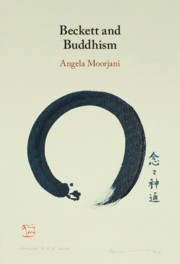
- Publisher:
- Cambridge University Press
- Online publication date:
- July 2021
- Print publication year:
- 2021
- Online ISBN:
- 9781009024082
- Subjects:
- Literature, Literary Theory, English Literature after 1945

Beckett and Buddhism undertakes a twenty-first-century reassessment of the Buddhist resonances in Samuel Beckett's writing. These reverberations, as Angela Moorjani demonstrates, originated in his early reading of Schopenhauer. Drawing on letters and archives along with recent studies of Buddhist thought and Schopenhauer's knowledge of it, the book charts the Buddhist concepts circling through Beckett's visions of the 'human predicament' in a blend of tears and laughter. Moorjani offers an in-depth elucidation of texts that are shown to intersect with the negative and paradoxical path of the Buddha, which she sets in dialogue with Western thinking. She brings further perspectives from cognitive philosophy and science to bear on creative emptiness, the illusory 'I', and Beckett's probing of the writing process. Readers will benefit from this far-reaching study of one of the most acclaimed writers of the twentieth century who explored uncharted topologies in his fiction, theatre, and poetry.
‘Readers interested in the transmission of Eastern thought in modernist texts will find this exploration of the congruence of Beckett’s texts with Buddhist thought useful and informative … Recommended.’
J. S. Baggett Source: Choice Connect
'Moorjani is a scholar doing a scholar's work, and the results are exhilarating'
Jean-Michel Rabaté - University of Pennsylvania
‘… the study [goes] a long way toward illuminating things that have previously and notoriously puzzled readers of Beckett, from the paradoxical style to the seeming pessimism that pervades his works. … Moorjani’s study deserves to be known to readers not only in twentieth-century literary studies but also in world literature, comparative literature, and beyond.’
Lidan Lin Source: Modern Language Quarterly
‘… this impressive monograph not only continues Moorjani’s long career of path-breaking contributions to Beckett studies, but it achieves a mastery of material and persuasiveness of exposition that few researchers can ever hope to attain.’
Douglas Atkinson Source: The Beckett Circle
‘Beckett and Buddhism explores the 'imaginative dialogue' between Samuel Beckett's writing and Buddhist and Eastern thought. Drawing on published correspondence and prodigious archival material both to confirm Schopenhauer as a source of Beckett's knowledge of Buddhism and to substantiate her research, Angela Moorjani traces back Buddhist influences on the author's early fiction and meticulously uncovers their reverberations in his entire oeuvre.’
Nadia Louar Source: L'Esprit Créateur
‘Moorjani undertakes 'to refute the charge of nihilism against Beckett' (p. 76) by focussing on how the effect of emptiness or emptying (a key Buddhist notion) is realized with powerful aesthetic and spiritual impact in particular texts, underlining in particular the role of meditation in Beckett's later works and the value attached to the void as a longed-for 'home'.'
Joseph S. O'Leary Source: Journal of Irish Studies
 Loading metrics...
Loading metrics...
* Views captured on Cambridge Core between #date#. This data will be updated every 24 hours.
Usage data cannot currently be displayed.
Accessibility compliance for the PDF of this book is currently unknown and may be updated in the future.